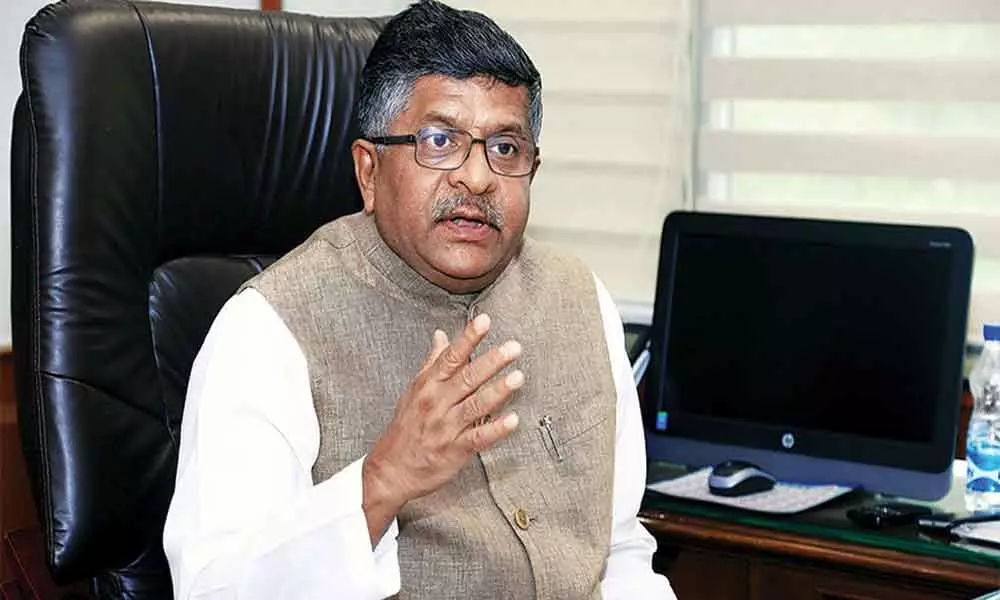Digital ecosystem needs a legal framework for governance: Ravi Shankar Prasad

Ravi Shankar Prasad
"Technology is going to be play a very crucial role in the future of Law Education and India must play a leading role in the international legal system," said Ravi Shankar Prasad
New Delhi: "Technology is going to be play a very crucial role in the future of Law Education and India must play a leading role in the international legal system," said Ravi Shankar Prasad, Union Minister for Communications, Electronics & Information Technology and Law & Justice in his inaugural address for the global academic Conference on the theme 'Reimagining & Transforming the Future of Law Schools and Legal Education: Confluence of Ideas During & Beyond COVID-19'.
He also stated that the digital ecosystem needs a legal framework for governance which young Indian law students must pursue for a successful career.
"During the pandemic, it was the digital ecosystem which kept the world together. Be it the internet, IT enabled platforms or mobile phones to make digital connectivity simpler and effective, we continued to function in India through these digital systems. The global pandemic has created havoc with the lives, health and safety of people but it has also given us a lot of opportunity. It has created many challenges which require legal solutions.
"Though this transformation is important in the digital ecosystem, the future of legal education must focus on technology. Technology creates opportunity but it also poses challenges especially for regulation. Law Schools need more adoption of technology related legal education to prepare students for a successful career. It is very important that these challenges must be taught in law schools. Indian students are second to none but they also need proper exposure in global platforms. Understanding of technology related laws is a very important aspect which law schools must focus on," he added.
"Technology has been widely used for governance in India especially for welfare entitlements. Artificial Intelligence (AI) has become the norm and we need to harness it for health, education, agriculture and more but what should be the limit of AI? Should human ethics have a role? What should be the legal architecture of the application of AI? Any digital-legal system must not be completely oblivious of the basic time-tested attributes of human behaviour based on ethical values.
"The data economy will create other challenges too with issues like: Data economy and taxation, cyber-crimes and jurisdiction, cyber bullying, rogue elements, hacking of data. The internet is a global platform but it has to connect to local ideas, culture and sensitivities. What should be the architecture of law in these areas? India is emerging as a global power, there is a compelling need for India to play its destined role in the international legal system as well", Prasad said.
C. Raj Kumar, Founding Vice Chancellor of O.P. Jindal Global University said, "Nearly 10 months since the outbreak of Covid-19, unfortunately, we are still in the midst of the pandemic, surrounded by innumerable questions about the future trajectories of legal education, globally. As much as the pandemic can dampen our spirits; it has also awakened an innovative spirit in us, prompting us to find creative solutions and novel ideas, making the way forward.
"There is a need for law schools to shed the comforts of the past and espouse newer imaginations and embrace radical ideas. Only such revolutionary openness to ideas and rapid responses to challenges can help legal education overcome the crisis. It is beyond doubt that time calls for daring and extraordinary experiments, and this conference aims to invoke this thought process globally by bringing together thought leaders of the legal fraternity from across the world including Law School Deans, Supreme Court Judges, Law Firm Partners, Senior Advocates, Lawyers, Law Professors."
"It is true that the pandemic has changed the world and the legal profession forever. What has not changed is the quest for justice and the need for all civilized societies and nations to provide speedy justice. Humanity still needs justice and the professionals in pursuit of that human goal. The rule of law is aligned with the basic human condition particularly in free societies.
"Modern legal education must incorporate emotional intelligence along with legal knowledge and skills with personal effectiveness and an entrepreneurial mindset. Law education must also focus on technology, social media skills, data analytics, data security and design thinking. The pre-pandemic model of law education is no longer the default position but will evolve into a hybrid system where faculty and students will become a borderless community," said Cyril Shroff, Managing Partner of one of India's leading law firms –- Cyril Amarchand Mangaldas, in his keynote address.
This Conference has brought together nearly 170 thought leaders from six continents and 35 countries over 30 thematic Sessions and two keynote addresses to reimagine the future of legal education.














